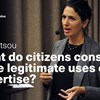uses

Eri Bertsou: What do citizens consider to be politically legitimate uses of expertise?
Can democratic politics incorporate citizen demands for independent expertise in ways that boost legitimacy and trust in politics? Democratic governments worldwide face the dilemma of how to deal with
Eri Bertsou: Varieties of Expertise: What do citizens consider to be politically legitimate uses of expertise
Venue: Institutet för framtidsstudier, Holländargatan 13, 4th floor, Stockholm, and online Research seminar with Eri Bertsou, Assistant Professor of Political Science, University of St. Gallen (HSG).REG
Can AI be used to avoid discrimination during recruitment?
More and more businesses use AI – artificial intelligence – in recruitment. But what happens when they do so? The research project Can the implementation of artificial intelligence in the recruitment p, led by sociologist Moa Bursell, can give us some answers.
Deep learning diffusion by infusion into preexisting technologies - Implications for users and society at large
in: Technology in Society. 63, 101396 Abstract:Artificial Intelligence (AI) in the form of Deep Learning (DL) technology has diffused in the consumer domain in a unique way as compared to previous gene, i.e., by being added to preexisting technologies that are already in use. We find that DL-algorithms for recommendations or ranking have been infused into all the 15 most popular mobile applications (apps) in the U.S. (as of May 2019). DL-infusion enables fast and vast diffusion. For example, when a DL-system was infused into YouTube, it almost immediately reached a third of the world's population. We argue that existing theories of innovation diffusion and adoption have limited relevance for DL-infusion, because it is a process that is driven by enterprises rather than individuals. We also discuss its social and ethical implications. First, consumers have a limited ability to detect and evaluate an infused technology. DL-infusion may thus help to explain why AI's presence in society has not been challenged by many. Second, the DL-providers are likely to face conflicts of interest, since consumer and supplier goals are not always aligned. Third, infusion is likely to be a particularly important diffusion process for DL-technologies as compared to other innovations, because they need large data sets to function well, which can be drawn from preexisting users. Related, it seems that larger technology companies comparatively benefit more from DL-infusion, because they already have many users. This suggests that the value drawn from DL is likely to follow a Matthew Effect of accumulated advantage online: many preexisting users provide a lot of behavioral data, which bring about better DL-driven features, which attract even more users, etc. Such a self-reinforcing process could limit the possibilities for new companies to compete. This way, the notion of DL-infusion may put light on the power shift that comes with the presence of AI in society.
Forecasting Global Growth by Age Structure Projections
This paper uses demographic projections of age structure and correlations with GDP and GDP growth to study the forecasting properties of demographically based models. Extending the forecasts to 2050 s
Low Fertility and Long Run Growth in an Economy with a Large Public Sector
An important mechanism in low fertility countries is social interactions and its effects on ideal family size; as this is hard to capture in formal models, this paper uses an agent based simulation mo
Completed: Good and just allocation of health-related resources
How should health-related resources be allocated at the population-level? This project explores some problems with conventional approaches and presents a new one.
More about cookies
Iffs use cookies to se what our users read on our site and to view visitor statistics. We use cookies to develop our site according to how you use it. We do this to create the best possible experience
Toward a hybrid theory of how to allocate health-related resources
Journal of Medicine and Philosophy Abstract How should scarce health-related resources be allocated? This paper argues that values that apply to these decisions fail to always fully determine what we sh








